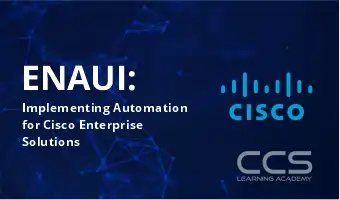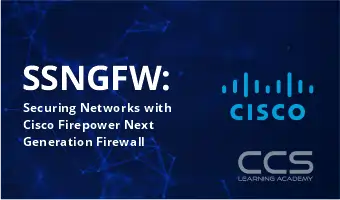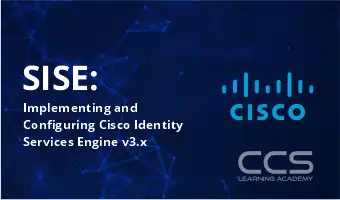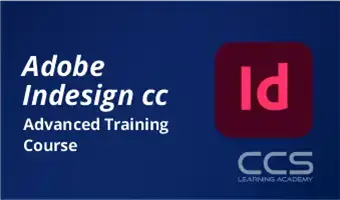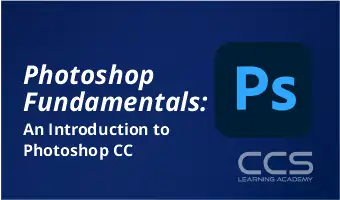Filter by Topic
Filter by Vendor
ENAUI: Implementing Automation for Cisco Enterprise Solutions
Implementing Automation for Cisco Enterprise Solutions (ENAUI) is a 3-day …
What you'll learn
Describe the various models and APIs of the Cisco IOS-XE platform to perform Day 0 operations, improve troubleshooting methodologies with custom tools, augment the Command-Line Interface (CLI) using scripts, and integrate various workflows using Ansible and Python
Explain the paradigm shift of model-driven telemetry and the building blocks of a working solution
Control the tools and APIs to automate Cisco DNA infrastructure managed by Cisco DNA Center™
Demonstrate workflows (configuration, verification, health checking, and monitoring) using Python, Ansible, and Postman
Explain Cisco SD-WAN solution components, implement a Python library that works with the Cisco SD-WAN APIs to perform configuration, inventory management, and monitoring tasks, and implement reusable Ansible roles to automate provisioning new branch sites on an existing Cisco SD-WAN infrastructure
Manage the tools and APIs to automate Cisco Meraki managed infrastructure and demonstrate workflows (configuration, verification, health checking, monitoring) using Python, Ansible, and Postman
SSNGFW: Securing Networks with Cisco Firepower Next Generation Firewall
Course Description: This lab-intensive 5-day course introduces the student to …
What you'll learn
Describe the Cisco Firepower Threat Defense system and key concepts of NGIPS and NGFW technology
Describe how to perform the configurations tasks required for implementing a Cisco Firepower Threat Defense device
Describe how to implement quality of service (QoS) and Network Address Translation (NAT) by using Cisco Firepower Threat Defense
Perform an initial network discovery using Cisco Firepower to identify hosts, applications, and services
Identify and create the objects required as prerequisites to implementing access control policies
Describe the behavior, usage, and implementation procedure for access control policies
Describe the concepts and implementation procedure of security intelligence features
Describe Cisco Advanced Malware Protection (AMP) for Networks and the implementation procedure of file control and advanced malware protection
Implement and manage intrusion policies
Explain the use of network analysis policies and the role of preprocessor technology in processing network traffic for NGIPS inspection
Describe and demonstrate the detailed analysis techniques and reporting features provided by the Cisco Firepower Management Center
Describe key Cisco Firepower Management Center system administration and user account management features
Describe the processes that can be used to troubleshoot Cisco Firepower Threat Defense systems
SISE: Implementing and Configuring Cisco Identity Services Engine v3.x
Course Description: Learn to install, configure, and deploy ISE with …
What you'll learn
Describe Cisco ISE architecture, installation, and distributed deployment options
Configure Network Access Devices (NADs), policy components, and basic authentication and authorization policies in Cisco ISE
Implement Cisco ISE web authentication and guest services
Deploy Cisco ISE profiling, posture, and client provisioning services
Describe administration, monitoring, troubleshooting, and TrustSec SGA security
Configure device administration using TACACS+ in Cisco ISE
Certified Incident Handler | ECIH
Course Description The EC-Council Certified Incident Handler (ECIH) program focuses …
What you'll learn
To enable individuals and organizations with the ability to handle and respond to different types of cybersecurity incidents in a systematic way.
To ensure that organization can identify, contain, and recover from an attack.
To reinstate regular operations of the organization as early as possible and mitigate the negative impact on the business operations.
To be able to draft security policies with efficacy and ensure that the quality of services is maintained at the agreed levels.
To minimize the loss and after-effects breach of the incident.
For individuals: To enhance skills on incident handling and boost their employability.
InDesign Fundamentals: An Introduction To InDesign CC
Helping Students To Deliver Unparalleled Creative Freedom With InDesign CC …
Adobe InDesign cc Advanced Training Course
Getting Started The Adobe InDesign CC advanced training course by …
What you'll learn
Quick overview of what’s new in CC
Creating tables
Working with transparency
Color/color management
Printing and exporting
Creating Adobe PDF files with form fields
Creating and exporting an e-book
Creating an iPad publication
Working with long documents
Photoshop Fundamentals: An Introduction to Photoshop CC
Course Description This 3-day Introduction to Photoshop CC course provides …
What you'll learn
Interface, tools, and features of Photoshop CC
Photoshop CC tricks and tips
Adobe Photoshop CC Advanced Print and Photography
Making Photoshop More Motivating Presenting The Adobe Photoshop CC Advanced: …

